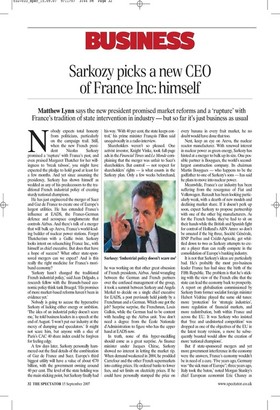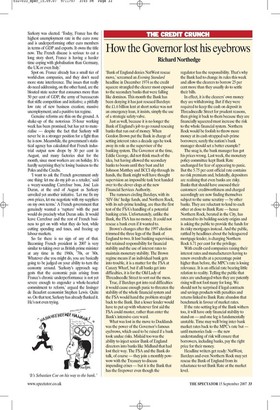Sarkozy picks a new CEO of France Inc: himself
Matthew Lynn says the new president promised market reforms and a 'rupture' with France's tradition of state intervention in industry — but so far it's just business as usual Nobody expects total honesty from politicians, particularly on the campaign trail. Still, when the new French president Nicolas Sarkozy promised a 'rupture' with France's past, and even praised Margaret Thatcher for her willingness to 'break taboos', you might have expected the pledge to hold good at least for a few months. And yet since assuming the presidency, Sarkozy has shown himself as wedded as any of his predecessors to the traditional French industrial policy of creating sturdy national champions.
He has just engineered the merger of Suez and Gaz de France to create one of Europe's largest utilities. He has extended France's influence at EADS, the Franco-German defence and aerospace conglomerate that controls Airbus. And there's talk of a merger that will bulk up Areva, France's world-leading builder of nuclear power stations. Forget Thatcherism with a Gallic twist. Sarkozy looks intent on relaunching France Inc., with himself as chief executive. But does that have a hope of success? What other state-sponsored mergers can we expect? And is this really the right medicine for France's moribund economy?
`Sarkozy hasn't changed the traditional French industrial policy,' said Juan Delgado, a research fellow with the Brussels-based economic policy think tank Bruegel. 'His promises of more market-based reforms haven't been in evidence yet.'
Nobody is going to accuse the hyperactive Sarkozy of lacking either energy or ambition. The idea of an industrial policy doesn't scare me,' he told business leaders in a speech at the end of August. 'I won't put our industry at the mercy of dumping and speculators.' It might not scare him, but anyone with a slice of Paris's CAC 40 share index could be forgiven for feeling edgy.
A few days later, Sarkozy personally hammered out the final details of the combination of Gaz de France and Suez. Europe's third biggest utility will have a value of about €70 billion, with the government owning around 40 per cent. The level of the state holding was the main sticking point, but Sarkozy finally had his way. 'With 40 per cent, the state keeps control,' his prime minister Francois Fillon said unequivocally in a radio interview.
Shareholders weren't so pleased. One activist investor, Knight Vinke, took full-page ads in the Financial Times and Le Monde complaining that the merger was unfair to Suez's shareholders. But control — not respect for shareholders' rights — is what counts in the Sarkozy plan. Only a few weeks beforehand, he was working on that other great obsession of French presidents, Airbus. Amid wrangling between the German and French partners over the confused management of the group, it took a summit between Sarkozy and Angela Merkel to decide on a single chief executive for EADS, a post previously held jointly by a Frenchman and a German. Which one got the job? Surprise surprise, the Frenchman, Louis Gallois, while the German had to be content with heading up the Airbus unit. You don't need a degree from the Ecole Nationale d'Administration to figure who has the upper hand at EADS now.
In truth, none of this hyper-meddling should come as a great surprise. As finance minister under Jacques Chirac, Sarkozy showed no interest in letting the market rip. When demand weakened in 2004, he prodded Can-efour and the other French supermarkets into cutting prices. He ordered banks to lower fees, and set limits on electricity prices. If he could have personally stamped the price on every banana in every fruit market, he no doubt would have done that too.
Next, keep an eye on Areva, the nuclear reactor manufacturer. With renewed interest in nuclear power as green energy, Sarkozy has hinted at a merger to bulk up its size. One possible partner is Bouygues, the world's secondlargest construction company. Its chairman Martin Bouygues — who happens to be the godfather to one of Sarkozy's sons — has said he plans to move into nuclear power.
Meanwhile, France's car industry has been suffering from the resurgence of Fiat and Volkswagen. Renault has been looking particularly weak, with a dearth of new models and declining market share. If it doesn't perk up soon, expect Sarkozy to propose partnership with one of the other big manufacturers. As for the French banks, they've had to sit on their hands while the British and Spanish fight for control of Holland's ABN Amro: so don't be amazed if the big three, Societe Generale, BNP Paribas and Credit-Agricole, get whittled down to two as Sarkozy attempts to create a player than can really compete in the consolidation of Europe's banking industry.
It is not that Sarkozy's ideas are particularly bad. He's probably the most pro-business leader France has had since the birth of the Fifth Republic. The problem is that he's sticking with the view of the French elite that the state can lead the economy back to prosperity. A report on globalisation commissioned by Sarkozy from former socialist foreign minister Hubert Vedrine played the same old tunes: more 'protection' for 'strategic industries', more regulation of financial markets, and more redistribution, both within France and across the EU. It was Sarkozy who insisted that 'free and undistorted competition' was dropped as one of the objectives of the EU in the latest treaty revision, a move he subsequently boasted would allow the creation of more 'national champions'.
But if state-sponsored mergers and yet more government interference in the economy were the answers, France's economy wouldn't be in need of a cure. 'Five years ago, Germany was "the sick man of Europe"; three years ago, Italy took the baton,' noted Morgan Stanley's chief European economist Eric Chaney as Sarkozy was elected. 'Today, France has the highest unemployment rate in the euro zone and is underperforming other euro members in terms of GDP and exports. It owns the title now. The French disease is serious: to cut a long story short, France is having a harder time coping with globalisation than Germany, the UK or even Italy.'
Spot on. France already has a small tier of world-class companies, and they don't need more state interference. The issues that really do need addressing, on the other hand, are the bloated state sector that consumes more than 50 per cent of GDP; the army of bureaucrats that stifle competition and initiative; a pitifully low rate of new business creation; massive unemployment; and a punitive tax regime.
Genuine reforms are thin on the ground. A shake-up of the notorious 35-hour working week has been promised, but has yet to materialise — despite the fact that Sarkozy will never be in a stronger position for a fight than he is now. Meanwhile, the government's statistical agency has calculated that French industrial output now drops by 30 per cent in August, and many factories shut for the month, since most workers are on holiday. It's hardly surprising they're losing business to the Poles and the Czechs.
'I want to ask the French government only one thing: let me do my job as a retailer,' said a weary-sounding Can-efour boss, Jose Luis Duran, at the end of August as Sarkozy unveiled yet another initiative. 'Let me fix my own prices, let me negotiate with my suppliers on my own terms.' A French government that genuinely wanted a 'rupture' with the past would do precisely what Duran asks. It would leave Can-efour and the rest of French business to get on with what they do best, while cutting spending and taxes, and freeing up labour markets.
So far there is no sign of any of that. Becoming French president in 2007 is very similar to taking over as British prime minister at any time in the 1960s, '70s, or 'Ws. Whatever else you might do, you are basically going to be judged on your ability to turn the economy around. `Sarkozy's approach suggests that the economic pain arising from France's chronic underperformance is not yet severe enough to engender a whole-hearted commitment to reform,' argued the Insinger de Beaufort economist Stephen Lewis. Quite so. On that test, Sarkozy has already flunked it. He's not even trying.


























































 Previous page
Previous page